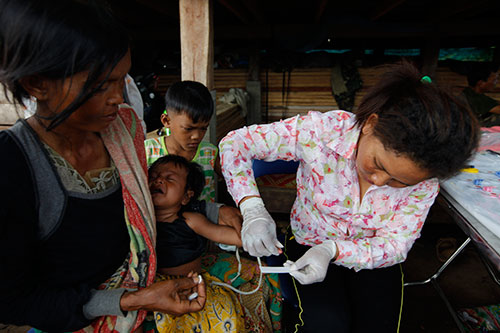The views expressed in our content reflect individual perspectives and do not represent the authoritative views of the Baha'i Faith.
O ye my loved ones! The world is wrapped in the thick darkness of open revolt and swept by a whirlwind of hate. It is the fires of malevolence that have cast up their flames to the clouds of heaven, it is a blood-drenched flood that rolleth across the plains and down the hills, and no one on the face of the earth can find any peace. Therefore must the friends of God engender that tenderness which cometh from Heaven, and bestow love in the spirit upon all humankind. With every soul must they deal according to the Divine counsellings and admonitions; to all must they show forth kindness and good faith; to all must they wish well. They must sacrifice themselves for their friends, and wish good fortune to their foes. They must comfort the ill-natured, and treat their oppressors with loving-kindness. They must be as refreshing water to the thirsty, and to the sick, a swift remedy, a healing balm to those in pain and a solace to every burdened heart. They must be a guiding light to those who have gone astray, a sure leader for the lost. They must be seeing eyes to the blind, hearing ears to the deaf, and to the dead eternal life, and to the despondent joy forever. – Abdu’l-Baha, Selections from the Writings of Abdu’l-Baha, pp. 318-319.
Those words from Abdu’l-Baha define what it means to be a Baha’i.
Perhaps that gentle, loving admonition to be “a swift remedy” to the sick and a “healing balm to those in pain” explains why so many Baha’is have entered the fields of medicine and public health. Baha’is try to actively concern themselves with the physical and spiritual health of the planet by serving others and helping to rid the world of deadly diseases.
So Baha’is pay attention when the World Health Organization and the United Nations celebrate World Health Day on April 7th every year, drawing awareness annually to a single, global public health problem – and what needs to be done to address it. This year, World Health Day spotlights vector-borne diseases, the deadly illnesses spread by mosquitoes, ticks, flies, bugs and freshwater snails.
Have you ever been bitten by an insect?
Almost everyone has – but in the developed nations of the world aggressive eradication campaigns, preventive drugs and vaccinations against vector-borne diseases, and the work of mosquito control districts has drastically reduced your chance of dying from an insect bite.
But in the developing world, more than half of the planet’s population risks getting a deadly vector-borne disease – malaria, dengue fever, leismaniasis (which causes blindness) and yellow fever. The world’s poorest people have the greatest risk; and as usual children bear the brunt of these terrible, preventable illnesses.
As a world civilization, thanks to the enormous efforts of the international public health community and donations from foundations and NGOs, we’ve made enormous strides in combating the vector-borne scourge. According to the World Malaria Report published by the WHO, “Global efforts to control and eliminate malaria have saved an estimated 3.3 million lives since 2000, reducing malaria mortality rates by 45% globally and by 49% in Africa.”
Prevention and control measures have created a consistent decline in malaria deaths and illness, despite an increase in the global population at risk of malaria. According to the WHO, “The large majority of the 3.3 million lives saved between 2000 and 2012 were in the 10 countries with the highest malaria burden, and among children aged less than 5 years – the group most affected by the disease. Over the same period, malaria mortality rates in children in Africa were reduced by an estimated 54%.”
This progress heartens everyone in the public health field, but great needs remain. In 2012, the world experienced an estimated 207 million cases of malaria, which caused approximately 627,000 malaria deaths – mostly among children. More than three billion people continue to be at risk of malaria, mostly in south-east Asia and in Africa, where 80% of malaria cases occur.
However — as the world contracts, and as climate change makes previously temperate regions hotter, the risks have become much more prevalent in other places. To prevent these deadly diseases from spreading any further, everyone can take a few simple precautions to protect ourselves and our families – we can sleep under a bednet, wear long-sleeved shirts and long pants and use insect repellent. If we live in or travel to malarial regions, we can take preventive medication – although medication isn’t yet affordable for the world’s poorest people. And we can do our best to help others prevent and recover from vector-borne diseases worldwide, contributing to the public health campaigns the WHO supports.
What have the Baha’is done? In places like India and in many countries in Africa, Baha’is have focused on training volunteers as health care workers in their own communities, to spread public health information and care for the sick:
As Baha’i communities, particularly in Africa, increasingly initiated primary health care projects, efforts were made to link UN agencies with Baha’i communities. In 1989 the Baha’i International Community established working relations with the World Health Organization (WHO). The Baha’i International Community sponsored the development of a model training program for volunteer community health care workers. – Baha’i International Community, February 1995.
Please join us in the global work to eradicate vector-borne diseases.



















Comments
Sign in or create an account
Continue with Facebookor